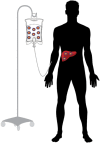Hemophilia gene therapy comes of age
- PMID: 29222308
- PMCID: PMC6142599
- DOI: 10.1182/asheducation-2017.1.587
Hemophilia gene therapy comes of age
Abstract
Concurrent with the development of recombinant factor replacement products, the characterization of the F9 and F8 genes over 3 decades ago allowed for the development of recombinant factor products and made the hemophilias a target disease for gene transfer. The progress of hemophilia gene therapy has been announced in 3 American Society of Hematology scientific plenary sessions, including the first "cure" in a large animal model of hemophilia B in 1998, first in human sustained vector-derived factor IX activity in 2011, and our clinical trial results reporting sustained vector-derived factor IX activity well into the mild or normal range in 2016. This progression to clinically meaningful success combined with numerous ongoing recombinant adeno-associated virus (rAAV)-mediated hemophilia gene transfer clinical trials suggest that the goal of gene therapy to alter the paradigm of hemophilia care may soon be realized. Although several novel therapeutics have recently emerged for hemophilia, gene therapy is unique in its potential for a one-time disease-altering, or even curative, treatment. This review will focus on the prior progress and current clinical trial investigation of rAAV-mediated gene transfer for hemophilia A and B.
© 2016 by The American Society of Hematology. All rights reserved.
Conflict of interest statement
Conflict-of-interest disclosure: The author has consulted for Pfizer.
Figures


References
-
- Mannucci PM, Tuddenham EG. The hemophilias--from royal genes to gene therapy. N Engl J Med. 2001;344(23):1773-1779. - PubMed
-
- Mingozzi F, High KA. Therapeutic in vivo gene transfer for genetic disease using AAV: progress and challenges. Nat Rev Genet. 2011;12(5):341-355. - PubMed
-
- Ohmori T, Mizukami H, Ozawa K, Sakata Y, Nishimura S. New approaches to gene and cell therapy for hemophilia. J Thromb Haemost. 2015;13(suppl 1):S133-S142. - PubMed
Publication types
MeSH terms
Substances
Grants and funding
LinkOut - more resources
Full Text Sources
Other Literature Sources
Medical
Miscellaneous

